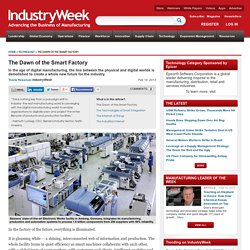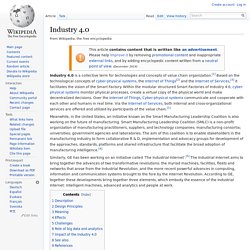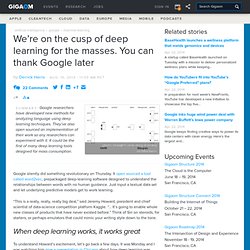

Automation of Manufacturing. Automated Consumer Products. Workforce/Social Changes. "Self-Aware" and "complex creative" electrtonics & robots. IERC_Cluster_Book_2014_Ch.3_SRIA_WEB.pdf. Technology content from IndustryWeek. Siemens’ state-of-the-art Electronic Works facility in Amberg, Germany, integrates its manufacturing, production and automation systems to process 1.6 billion components from 250 suppliers with 99% reliability.

In the factory of the future, everything is illuminated. It is gleaming white -- a shining, interconnected web of information and production. The whole facility hums in quiet efficiency as smart machines collaborate with each other, with a global team of savvy workers, with customers and clients, intelligent analytics and dynamic systems all across the farthest extremes of the supply chain. Industry 4.0: From the Internet of Things to Smart Factories - Video Link. Industry 4.0. Industry 4.0 is a collective term for technologies and concepts of value chain organization.[1] Based on the technological concepts of cyber-physical systems, the Internet of Things[2] and the Internet of Services,[3] it facilitates the vision of the Smart Factory.

Within the modular structured Smart Factories of Industry 4.0, cyber-physical systems monitor physical processes, create a virtual copy of the physical world and make decentralized decisions. Over the Internet of Things, Cyber-physical systems communicate and cooperate with each other and humans in real time. Via the Internet of Services, both internal and cross-organizational services are offered and utilized by participants of the value chain.[1] Meanwhile, in the United States, an initiative known as the Smart Manufacturing Leadership Coalition is also working on the future of manufacturing. How Uber’s Autonomous Cars Will Destroy 10 Million Jobs And Reshape The Economy by 2025.
Commentary By Zack Kanter @zackkanter, Entrepreneur and Futurist I have spent quite a bit of time lately thinking about autonomous cars, and I wanted to summarize my current thoughts and predictions.

Most people – experts included – seem to think that the transition to driverless vehicles will come slowly over the coming few decades, and that large hurdles exist for widespread adoption. Shaping Tomorrow Login. Artificial Intelligence. We’re on the cusp of deep learning for the masses. You can thank Google later. Google silently did something revolutionary on Thursday.

It open sourced a tool called word2vec, prepackaged deep-learning software designed to understand the relationships between words with no human guidance. Just input a textual data set and let underlying predictive models get to work learning. “This is a really, really, really big deal,” said Jeremy Howard, president and chief scientist of data-science competition platform Kaggle. “… It’s going to enable whole new classes of products that have never existed before.” Think of Siri on steroids, for starters, or perhaps emulators that could mimic your writing style down to the tone. When deep learning works, it works great. Artificial Intelligence and Manufacturing. Will Robots Take Our Jobs? (Part Two)